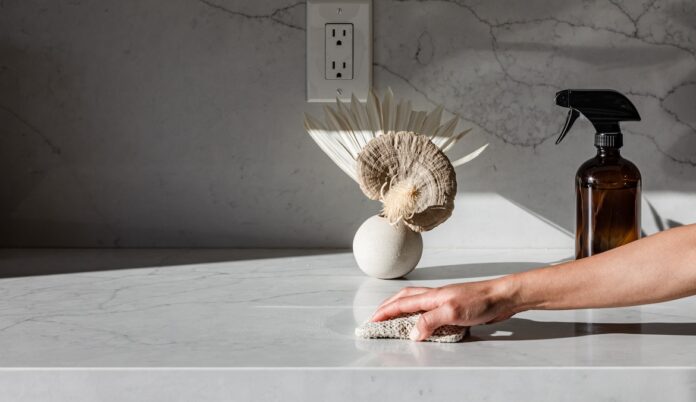[ad_1]
Vinegar (aka acetic acid) is greater than versatile as a family cleaner: It’s nice as a kitchen degreaser, DIY material softener, or instrument for eradicating laborious water stains out of your tub or some other dirty, grimy places (extra on this beneath). However does vinegar kill germs like those that trigger a nasty chilly or COVID-19 an infection? We checked in with a microbiologist and a cleansing professional to search out out precisely what vinegar can and may’t do within the disinfecting division.
Is vinegar a secure and pure disinfectant for house use?
In the event you’re questioning whether or not vinegar is definitely a disinfectant (aka kills germs), the reply is simply partially. It’s not classified as a disinfectant by the Environmental Protection Agency (EPA) as a result of it doesn’t kill 99.9 % of disease-causing germs (aka micro organism and viruses), as is deemed essential by EPA requirements for public well being.
That stated, vinegar could disinfect some surfaces in your house, relying on the micro organism and viruses hanging round on them. “Acetic acid has been proven to behave as a disinfectant on some microbial species including Pseudomonas aeruginosa1, and Escherichia coli (E. coli), which will be widespread in the home,” explains Jason Tetro, a microbiology researcher on the University of Alberta. (For the file, these are micro organism that trigger issues like pneumonia and meals poisoning, respectively.)
Notice, nonetheless, that vinegar just isn’t utterly efficient towards different widespread micro organism, together with Staphylococcus aureus (recognized for inflicting staph infections), Listeria monocytogenes (one reason for a critical type of meals poisoning referred to as listeriosis), or Klebsiella pneumoniae (a reason for meningitis), in line with Tetro. And also you can’t count on the efficacy of vinegar3 towards germs that trigger norovirus (a nasty abdomen bug) or COVID-19 an infection.
And despite the fact that vinegar can be utilized to kill some kinds of germs, it may possibly’t be relied upon for whole elimination. Analysis on vinegar as a pure disinfectant often measures its efficacy at a focus of 10 % acidity, however most drugstore or grocery retailer bottles of white vinegar or cleansing vinegar solely have a focus of 5 to 6 % acidity. (You can purchase more concentrated versions of vinegar, although, to extend its germ-killing properties.)
As for the available choices, although? The vinegar will simply cut back the variety of germs on a floor versus killing all of them, “and if you’re coping with potential pathogens and fecal micro organism, you don’t wish to accept discount,” says Tetro. In spite of everything, some stage of publicity to disease-causing micro organism and viruses can nonetheless make you sick.
How does vinegar examine to chemical disinfectants in killing germs?
Vinegar doesn’t match as much as widespread chemical disinfectants in killing germs. For instance, ethanol (aka ethyl alcohol), the lively ingredient in most hand sanitizers, can kill many different kinds of disease-causing germs in about 10 seconds, as can hydrogen peroxide, in as little as a couple of minutes, in line with the Facilities for Illness Management and Prevention (CDC).
Whereas vinegar at a excessive focus can cut back the variety of pathogens on a floor, it isn’t efficient towards all germs nor can or not it’s relied on to completely remove the germs it may possibly kill. For these causes, vinegar just isn’t a superb pure disinfectant, however it may possibly nonetheless be used as a unhazardous cleansing product (to take away grime, particles, and some germs) on just a few surfaces in your house.
Easy methods to clear with vinegar
Whilst you shouldn’t depend on vinegar to disinfect surfaces, you’ll be able to actually clear with it in most rooms of your private home. Specifically, it may be useful for cleansing chrome steel, whether or not it’s worthwhile to degrease a stovetop or scrub down a kitchen sink and tap, says Becky Rapinchuk, writer of Clean Mama’s Guide to a Healthy Home. She recommends mixing it with some water for an all-purpose cleaner (or you should buy a vinegar-based cleaner just like the Cymbiotika Multi-Purpose Cleaner Kit).
You can even clear with vinegar within the lavatory. Due to its acidic nature, it may possibly assist dissolve laborious water deposits or mineral buildup on the faucets or bathe heads, says Rapinchuk. Strive Mrs. Meyer’s Clean Day Vinegar Gel Cleaning Spray, which is made for this function and supreme for a fast clear (one-hour cleaning method, anybody?) because you don’t should rinse it.
Whereas vinegar may also be a helpful cleansing agent for loads of family surfaces, Rapinchuk warns towards utilizing it on pure stone (e.g., marble or granite) counter tops as a result of over time, it may possibly etch its floor. The identical goes for forged iron and waxed wooden, each of that are surfaces that the acidic element of vinegar can harm.
Does vinegar kill germs in laundry?
You could not have thought of utilizing vinegar in laundry, however it’s an interesting various to bleach (an efficient disinfectant) for individuals who wish to keep away from ruining coloured garments. Because it seems, vinegar can kill germs when utilized in a laundry machine—if it’s extremely concentrated. The examine assessing the efficacy of vinegar as a cleansing agent linked above additionally discovered that including sufficient concentrated vinegar (120 mL of a vinegar essence containing 25 % acetic acid) to a laundry load with sizzling water had a big disinfecting impact for widespread pathogens.
However once more, that requires a super-concentrated model of vinegar and never simply your on a regular basis stuff. Which means, you could be higher off simply going for one thing like Lysol Laundry Sanitizer.
That stated, it’s not a complete wash for on a regular basis white vinegar on the subject of laundry. You’ll be able to nonetheless use it to scrub the drum of a washer, assuming it’s made with chrome steel, says Rapinchuk. She recommends utilizing one or two cups of Aunt Fannie’s Extra Strength Cleaning Vinegar (relying on the dimensions of your washer) to get it clear.
Whereas the vinegar received’t essentially kill all of the germs in your garments and sheets (particularly for those who’re hit with COVID-19 or the dreaded norovirus), you can too add ¼ cup of vinegar per laundry load as a pure material softener and to assist deodorize materials, provides Rapinchuk.
How can I sanitize my home naturally?
With regards to vinegar vs. chemical disinfectants, it doesn’t fairly maintain up—however there are some artificial cleaners that mimic naturally occurring substances and which can be higher disinfectants than vinegar, like hydrogen peroxide, citric acid, and lactic acid, says Tetro.
At concentrations that you’ll find in most merchandise, like Seventh Generation Disinfecting Cleaner with Hydrogen Peroxide, hydrogen peroxide zaps a wide range of pathogens, like SARS-CoV-2 (which causes COVID-19) and rhinovirus, which causes the widespread chilly.
To get extra mileage out of your cleansing (and skip unnecessary cleaning products), you should use hydrogen peroxide and vinegar back-to-back, says Rapinchuk, as long as you don’t mix them (which creates a corrosive acid that may irritate the pores and skin and lungs). Rapinchuk’s methodology? Spray a floor with a vinegar cleaner, rinse completely, then use hydrogen peroxide to disinfect.
By the same token, citric acid (an acid discovered naturally in citrus fruits) is one other efficient disinfectant, which works by disrupting the cell membrane of bacteria4. You should use a citric acid-containing cleaner like Blueland Glass + Mirror Cleaner to each sanitize and do away with greasy fingerprints in your mirrors, home windows, or medication cupboard.
And lactic acid, one other natural acid, additionally has antimicrobial properties5, particularly when used in a concentration of at least 0.5 percent6. Yow will discover it on this Better Life Tea Tree and Peppermint Toilet Bowl Cleaner, which mixes each citric acid and lactic acid for a clear with stable disinfecting capabilities.
Effectively+Good articles reference scientific, dependable, current, sturdy research to again up the knowledge we share. You’ll be able to belief us alongside your wellness journey.
- Fraise, A P et al. “The antibacterial exercise and stability of acetic acid.” The Journal of hospital an infection vol. 84,4 (2013): 329-31. doi:10.1016/j.jhin.2013.05.001
- Entani, E et al. “Antibacterial motion of vinegar towards food-borne pathogenic micro organism together with Escherichia coli O157:H7.” Journal of meals safety vol. 61,8 (1998): 953-9. doi:10.4315/0362-028x-61.8.953
- Zinn, Marc-Kevin, and Dirk Bockmühl. “Did granny know greatest? Evaluating the antibacterial, antifungal and antiviral efficacy of acetic acid for house care procedures.” BMC microbiology vol. 20,1 265. 26 Aug. 2020, doi:10.1186/s12866-020-01948-8
- Li, Xue-Music et al. “Citric Acid Confers Broad Antibiotic Tolerance by Alteration of Bacterial Metabolism and Oxidative Stress.” Worldwide journal of molecular sciences vol. 24,10 9089. 22 Could. 2023, doi:10.3390/ijms24109089
- Nishioka, Yuki et al. “Lactic acid as a significant contributor handy floor an infection barrier and its affiliation with morbidity to infectious illness.” Scientific experiences vol. 11,1 18608. 20 Sep. 2021, doi:10.1038/s41598-021-98042-4
- Wang, Chenjie, et al. “Antibacterial Mechanism of Lactic Acid on Physiological and Morphological Properties of Salmonella Enteritidis, Escherichia Coli and Listeria Monocytogenes.” Meals Management, vol. 47, Jan. 2015, 231–236, doi:10.1016/j.foodcont.2014.06.034
Our editors independently choose these merchandise. Making a purchase order by our hyperlinks could earn Effectively+Good a fee.
[ad_2]
Source link







